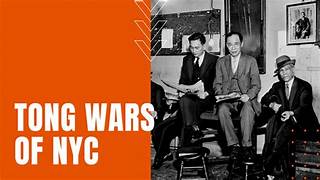On October 15, 1924, the United States witnessed a violent clash between rival Chinese criminal organizations known as the Chinese Tong Wars. These brutal conflicts, which primarily occurred in major cities with significant Chinese immigrant populations, highlighted the struggles and tensions within these communities and shed light on the criminal underworld that operated in the shadows.
The Tong Wars were a series of violent disputes between Chinese criminal organizations, known as tongs, which were involved in various illegal activities such as gambling, drug trafficking, prostitution, and extortion. These criminal groups, often formed along regional or familial lines, sought to control and dominate specific territories and industries within Chinese immigrant communities.
The origins of the Tong Wars can be traced back to the late 19th century when Chinese immigrants flocked to the United States in search of better economic opportunities. As these communities grew, rival tongs emerged, vying for power, influence, and control over illicit activities. The conflicts between these criminal organizations were often fueled by territorial disputes, economic rivalry, and personal vendettas.
The Tong Wars were characterized by their extreme violence. The clashes involved the use of firearms, knives, and other weapons, resulting in numerous deaths and injuries. Innocent bystanders were often caught in the crossfire, leading to fear and unrest within the Chinese immigrant communities. The violence associated with the Tong Wars garnered significant media attention and fueled stereotypes and prejudices against the Chinese community as a whole.
Law enforcement agencies struggled to contain the violence and bring the perpetrators to justice. The criminal nature of the tongs made it difficult for authorities to gather evidence and secure witness testimonies. The tongs operated in a secretive and organized manner, making it challenging for law enforcement to penetrate their networks and dismantle their operations.
The Tong Wars had a profound impact on Chinese immigrant communities in the United States. The violence and instability caused by these conflicts led to a sense of fear and mistrust within these communities. Many Chinese immigrants found themselves caught between rival factions, facing threats and acts of violence from both within and outside their own communities.
Efforts to address the violence and criminal activities associated with the Tong Wars led to increased scrutiny and discrimination against Chinese immigrants. The criminal activities of the tongs reinforced negative stereotypes and perceptions of the Chinese community, leading to broader anti-Chinese sentiment. This, in turn, fueled discriminatory policies such as the Chinese Exclusion Act, which restricted Chinese immigration and imposed various forms of discrimination against Chinese individuals.
Over time, law enforcement agencies and community leaders worked to curb the violence associated with the Tong Wars. The conflicts gradually subsided as rival tongs were weakened or disbanded, and law enforcement efforts intensified. However, the impact of the Tong Wars on Chinese immigrant communities and the broader perception of Chinese individuals in the United States would have lasting effects.
The Tong Wars of October 15, 1924, shed light on the violent struggles and criminal activities within Chinese immigrant communities in the United States. These conflicts highlighted the challenges faced by Chinese immigrants in a new and often hostile environment. While the Tong Wars eventually subsided, their legacy serves as a reminder of the struggles and resilience of immigrant communities and the complexities of criminal organizations operating within them.






